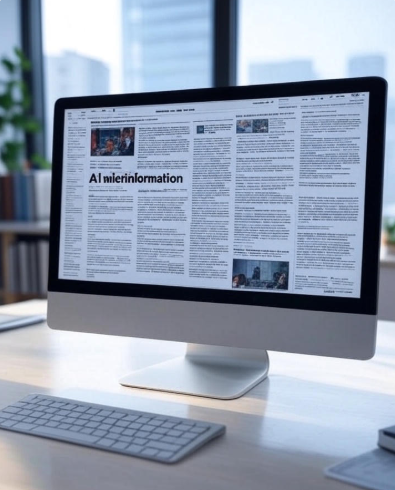Picture this: You’re scrolling through your phone, asking your AI assistant to summarize the latest news. You trust it completely after all, it’s artificial intelligence, right? It must be accurate. Well, according to a groundbreaking study by the BBC, that trust might be seriously misplaced.
The British Broadcasting Corporation recently conducted one of the most comprehensive studies ever done on AI news accuracy, and the results are eye-opening. We’re not talking about minor typos or slight misunderstandings. We’re talking about major factual errors, made-up quotes, and distorted information that could seriously mislead millions of people who rely on AI for their daily news consumption.
What the BBC Actually Found
The BBC’s research team took 100 news stories from their own website and fed them to some of the biggest names in AI: OpenAI’s ChatGPT, Microsoft’s Bing, Google’s Gemini, and Perplexity AI. Then they asked these AI systems questions about the news content and carefully analyzed the responses.
The results were shocking. 51% of all AI given answers were judged to have significant issues, and 19% which cited BBC content contained factual mistakes including incorrect statements, numbers and dates. Think about that for a moment – more than half of the AI responses had serious problems.
But it gets worse. 13 percent of the quotes sourced from BBC articles were either altered from the original source or not present in the article cited. This means AI systems weren’t just getting facts wrong – they were literally making up quotes and attributing them to BBC journalists.
Real Examples of AI Gone Wrong
Let’s look at some concrete examples of how these AI systems failed. Examples of errors included Gemini incorrectly saying the UK’s National Health Service had specific policies that didn’t exist. These weren’t minor details – these were fundamental misunderstandings about major institutions and policies.
The study revealed that some AI systems would take a news story about one topic and somehow generate responses about completely different subjects. Others would combine facts from multiple unrelated stories, creating what researchers described as a “confused cocktail” of information.
One particularly concerning finding was how AI systems handled quotes from news articles. Instead of reproducing exact quotes, they would paraphrase or alter them, sometimes changing the meaning entirely. Then they’d present these altered quotes as if they were the original words from the BBC articles.
Why This Matters More Than You Think
You might be thinking, “So what? People should know to double-check AI responses anyway.” But here’s the reality: millions of people are already using AI assistants for news summaries without realizing how unreliable they can be.
Consider how many people ask Siri about current events, or use Google’s AI features to get quick news updates. These aren’t tech experts who understand the limitations of AI – they’re ordinary people who trust these systems to give them accurate information.
The implications go far beyond individual users. News organizations, researchers, and even other AI systems sometimes rely on AI-generated summaries. When these summaries contain significant errors, those mistakes can spread and multiply across the internet.
The Technology Behind the Problem
To understand why AI systems struggle with news accuracy, we need to look at how they actually work. Large language models like ChatGPT and Gemini are trained on massive amounts of text data. They learn to predict what words should come next in a sentence, but they don’t truly “understand” the content in the way humans do.
When you ask an AI system to summarize a news article, it’s not reading and comprehending the story like a human would. Instead, it’s using statistical patterns from its training to generate text that seems relevant. This process can lead to several types of errors:
Hallucination: This is when AI systems generate information that sounds plausible but is completely made up. The system might “remember” similar stories from its training data and accidentally mix details from different events.
Context Confusion: AI systems sometimes struggle to maintain context throughout a longer response. They might start answering a question about one topic but gradually drift into discussing something else entirely.
Quote Fabrication: Since AI systems generate text probabilistically, they might create quotes that sound like something a person would say, but weren’t actually said by anyone.
Which AI Systems Performed Worst?
The BBC study revealed interesting differences between AI platforms. With Gemini showing the highest error rate and Perplexity AI leading in source citation, it became clear that not all AI systems are created equal when it comes to news accuracy.
Google’s Gemini had the highest rate of significant errors, while Perplexity AI was better at citing its sources (though this didn’t necessarily mean its information was more accurate). This suggests that the way AI systems are trained and designed can significantly impact their reliability for news-related tasks.
The Broader Impact on Trust and Democracy
The BBC’s findings raise serious questions about the role of AI in our information ecosystem. When AI systems consistently produce inaccurate news summaries, they’re not just spreading misinformation – they’re potentially undermining trust in legitimate news sources.
Here’s how this creates a dangerous cycle: People use AI to get news summaries, but the AI provides inaccurate information. When people compare this inaccurate information to actual news reports, they might conclude that the news sources themselves are unreliable. This erosion of trust in legitimate journalism can have serious consequences for democracy and public discourse.
The problem is particularly acute because AI-generated misinformation can be incredibly convincing. Unlike obviously fake news that might be poorly written or clearly biased, AI-generated content often sounds professional and authoritative, making it harder for people to recognize when it’s wrong.
What News Organizations Are Doing About It
The BBC’s study isn’t just academic research – it’s a call to action for the news industry. Many news organizations are now grappling with how to protect their content from being misrepresented by AI systems.
Some are considering technical solutions, like special formatting or metadata that could help AI systems better understand and accurately represent their content. Others are exploring legal approaches, potentially requiring AI companies to get permission before using their content for training or summarization.
The BBC itself has been vocal about the need for better regulation and oversight of AI systems, especially when they’re used for news and information purposes. They argue that AI companies have a responsibility to ensure their systems don’t spread misinformation, even unintentionally.
The AI Industry’s Response
Major AI companies have acknowledged the BBC’s findings, though their responses have varied. Some have emphasized that their systems are constantly being improved and that accuracy is a top priority. Others have pointed out that users should always verify important information from primary sources.
However, critics argue that this response places too much responsibility on users. Most people don’t have the time or expertise to fact-check every AI-generated summary they encounter. The expectation that ordinary users will catch errors that fool sophisticated AI systems seems unrealistic.
What Needs to Change
The BBC’s research highlights several areas where improvement is desperately needed:
Better Training Data: AI systems need to be trained on more diverse, accurate, and up-to-date information. This includes better fact-checking processes during the training phase.
Improved Evaluation Methods: AI companies need better ways to test their systems’ accuracy before releasing them to the public. The current approach of releasing systems and then fixing problems as they arise isn’t sufficient for news-related applications.
Transparency and Disclosure: Users need to understand when they’re getting AI-generated content and what the limitations of that content might be. This includes clear labeling and warnings about potential inaccuracies.
Regulatory Oversight: Some experts argue that AI systems used for news and information should be subject to the same accuracy standards as traditional media outlets.
What You Can Do to Stay Informed
While we wait for these systemic changes, there are steps you can take to protect yourself from AI-generated misinformation:
Always verify important information: If an AI system tells you something significant, check it against reliable news sources before acting on it or sharing it with others.
Understand the limitations: Remember that AI systems are tools, not oracles. They can make mistakes, especially when dealing with current events or complex topics.
Use multiple sources: Don’t rely on a single AI system or news source for important information. Cross-reference claims across multiple reliable sources.
Be skeptical of perfect summaries: If an AI-generated summary seems too neat or comprehensive, it might be filling in gaps with plausible-sounding but inaccurate information.
Insights
The BBC’s study serves as a crucial wake-up call about the current state of AI news accuracy. While artificial intelligence has incredible potential to help us process and understand information, we’re not there yet. The technology still has significant limitations that can lead to serious misinformation.
This doesn’t mean we should abandon AI tools entirely. Instead, we need to approach them with appropriate skepticism and understanding of their limitations. As this really questions the ability of AI to inform audiences accurately, we must demand better from AI companies and be more cautious about how we consume AI-generated content.
The future of news and information depends on getting this right. As AI systems become more sophisticated and widely used, ensuring their accuracy becomes increasingly critical. The BBC’s research shows we still have a long way to go, but it also provides a roadmap for the improvements we need to make.
Until these systems become more reliable, the old advice remains true: trust, but verify. In our age of artificial intelligence, that verification is more important than ever.



